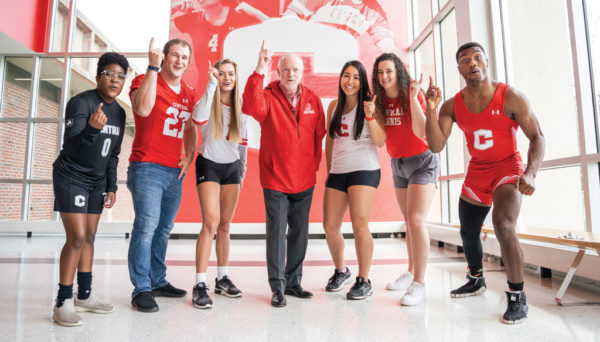
The Central Dutch advance the college’s mission and bring the community together. Representing the college’s 600 student-athletes are, left to right: Sheila Horstmann ’23 (soccer), Cody Wonderlich ’21 (football), Landry Luhring ’21 (volleyball), President Mark Putnam, Stevette Perez ’23 (cross country/track), Maddie Hartley ’22 (tennis) and Christian Wilson ’23 (wrestling).
During a recent conversation with our director of athletics, Eric Van Kley, I was reminded about the deepest values we hold with respect to intercollegiate athletics. We noted together the many challenges we have encountered during the pandemic with season delays, testing protocols, disrupted events and many, many adaptations.
I came away from the discussion with a sense of accomplishment for our ability to provide worthwhile and meaningful experiences for our student-athletes despite the complexities of the moment.
Central’s athletics department has a compelling philosophy that seeks to align the inherent drive for success in competition within a broader framework of understanding. Becoming a champion is our athletes’ aim, both individually and collectively. That impulse contributes to wider life ambitions as well.
Our student-athletes certainly want to be champions athletically. Most of our students cultivate these skills and ambitions from a very early age. The athletics experience contributes in part to a sense of personal identity. At its very best, that competitive spirit and team collaboration is developmentally rich and helps nurture life skills such as teamwork, self-discipline, sustained commitment and resilience. This setting is where many learn a greater sense of interdependence as they support one another, learn to play a role and remain teachable or coachable in the presence of others.
Central’s student-athletes also seek to be champions academically. I find it impressive to see many of our teams win awards for academic performance year after year. They take considerable pride in this. The sense of mutual support drives athletic achievement and informs academic performance. Our coaches press for academic success for individuals and teams, ensuring we always remember a successful student-athlete begins with being a student first.
Our student-athletes also endeavor to be champions professionally. To be sure, this is rooted in the expertise and competence gained through academic pursuits, but also emerges as a respectful and professional demeanor forged through interactions with coaches, teammates, opponents and officials. The sense of responsibility and completion of tasks are reinforced by the rigors of discipline and shared purpose. Being poised under pressure and controlling reactions to adverse situations fosters solution-focused thinking and adaptation on and off the field of competition.
When properly understood and organized, intercollegiate athletics is a compelling form of experiential learning that extends the reach of the classroom, studio and lab. It helps to bridge the student to professional settings and blends with other practice settings, including internships, service learning, undergraduate research and study abroad.
The collective benefits extend for many years beyond the college experience and, through time, yield champions in life. Go Dutch!












To encourage serious, intellectual discourse on Civitas, please include your first and last name when commenting. Anonymous comments will be removed.
Comments are closed.